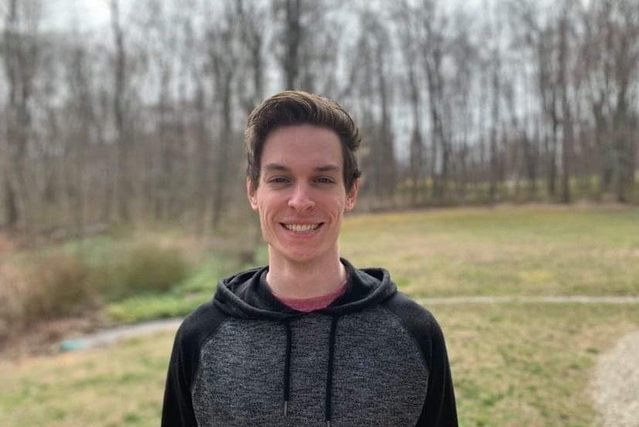This interview originally appeared on Naturally@UConn.
In the midst of a worldwide pandemic, Tyler Gavitt says he’s never felt more relevant. It took him a few departmental moves as an undergraduate to find his niche, but he now feels a calling to use his knowledge and join the fight against infectious respiratory diseases such as COVID-19. He is interested in a career with the Centers for Disease Control (CDC), studying transmission rates and reemergence of diseases. Here’s what he had to say about his experiences at UConn.
Where did you study as an undergraduate? What was your major?
I did my undergraduate degree at UConn as a molecular and cell biology major, then a master’s in pathobiology.
Why did you decide to go to graduate school?
I wanted to go to graduate school because I really wanted to have my own lab someday, and I knew that to do that, I’d need to get my Ph.D.
Who is your advisor? What is your field of research?
My advisor is Dr. Steven Szczepanek in the Department of Pathobiology and Veterinary Science. I predominantly study respiratory pathogens, with a specific focus on dysregulated host immune responses to infectious organisms. Our lab also does a lot of research on both vaccine design and vaccine efficacy.
Name one aspect of your work that you like.
Learning things that have never been known before. At the Ph.D. level, a lot of the work being done is very specific and usually very novel. When I make a new discovery in the lab, I’m always amazed by the fact that it’s entirely possible that no one has ever learned that information before, and that I just learned something completely new that I can share with other people. It’s my absolute favorite part of my job.
In your opinion, what is your greatest accomplishment so far?
We have a paper that was published in Vaccine that I’m very proud of. The data didn’t quite work out the way we expected it to, and a lot of the other scientists involved in the work thought it was a dead end, but I managed to put together an explanation of the data that we all felt contributed something important to that field, and got it published. From what I understand, a couple of people reasonably high up in the USDA saw the publication and really liked the work. It took me something like seventeen months and eleven drafts to get that paper to where I was happy with it, but I’m proud of the end result.
When do you expect to get your degree? What then?
I’m hoping to graduate with my Ph.D. by fall 2021 or spring 2022. After that, I’d like to try to postdoc with the CDC and eventually try to get full time employment working there.
Is there anything else you would like us to know about you?
I really love landscape and astrophotography. When I’m not working on campus, I try to go out with my cameras as often as possible to take photos. I really love that fulfilling feeling I get when I’ve been chasing a particular photo that I’ve been thinking about for weeks and then finally get that one perfect photo.



